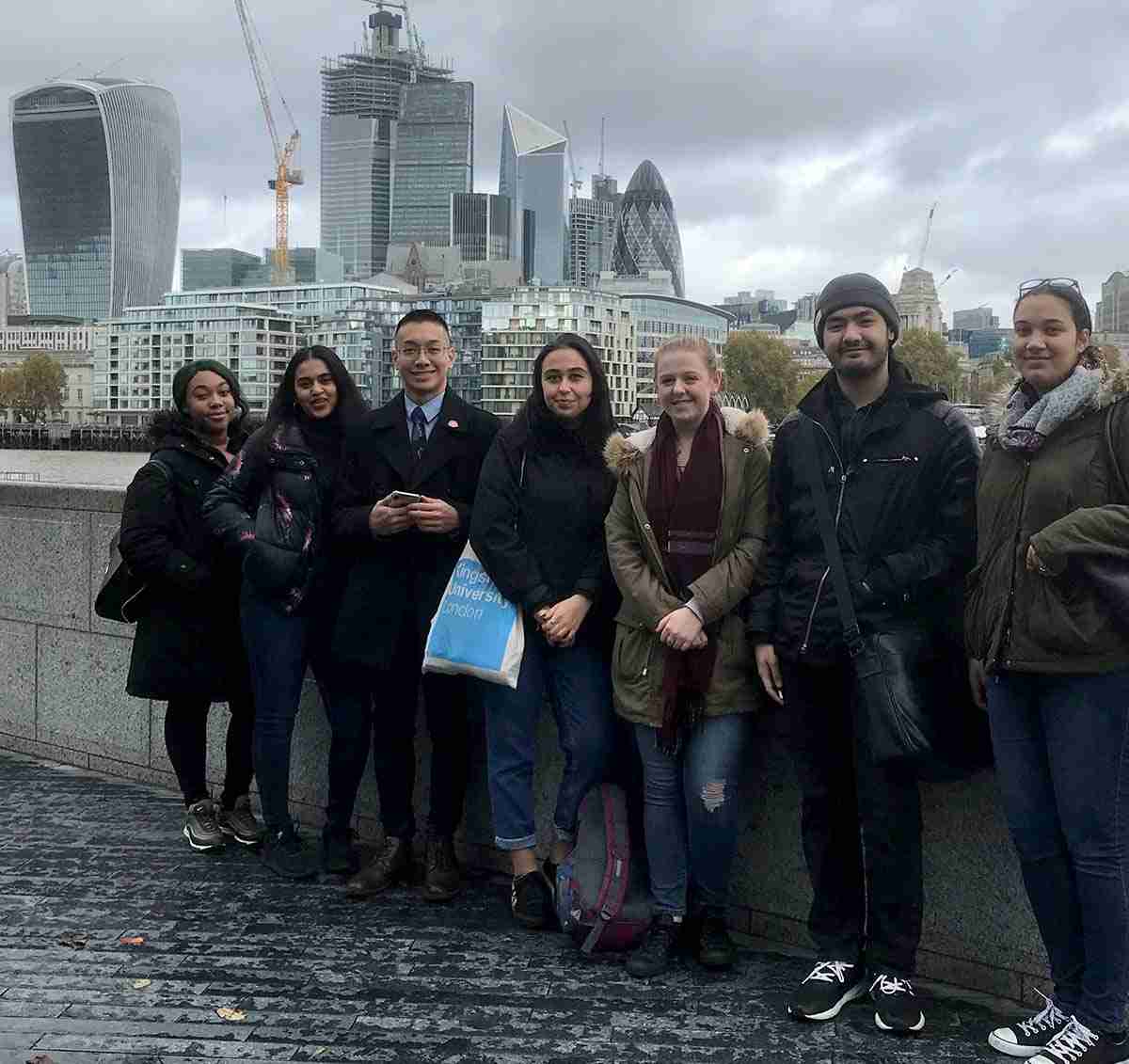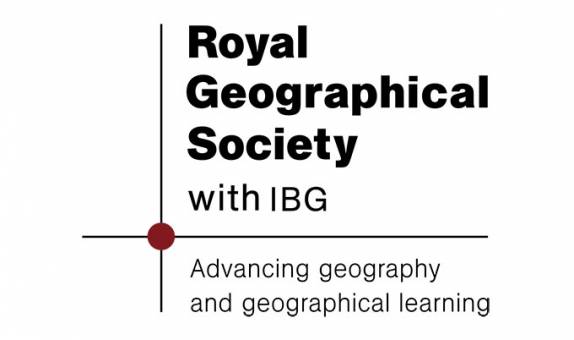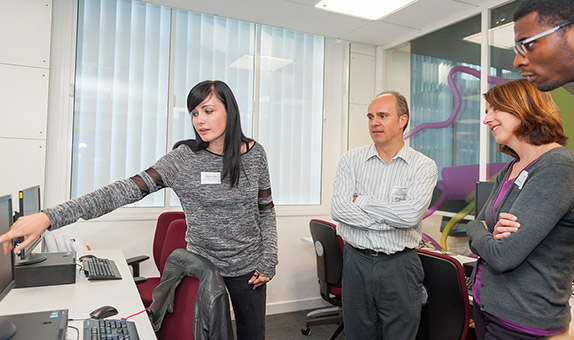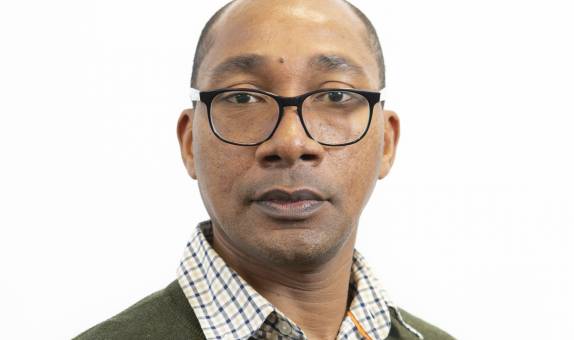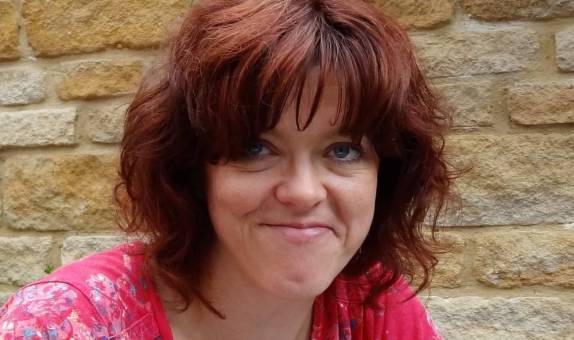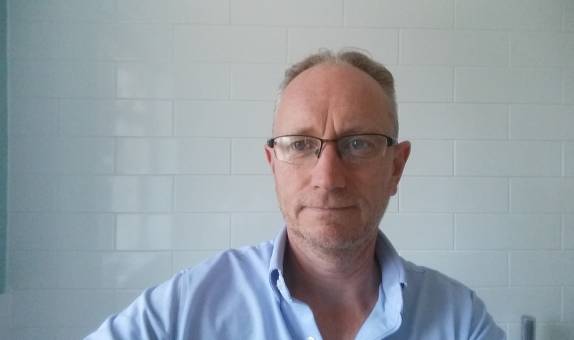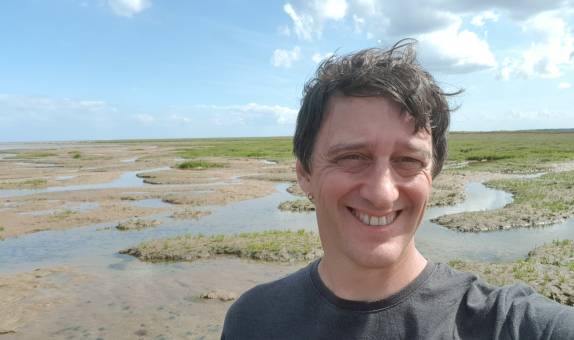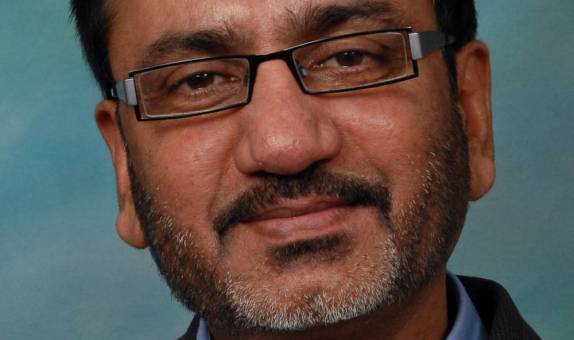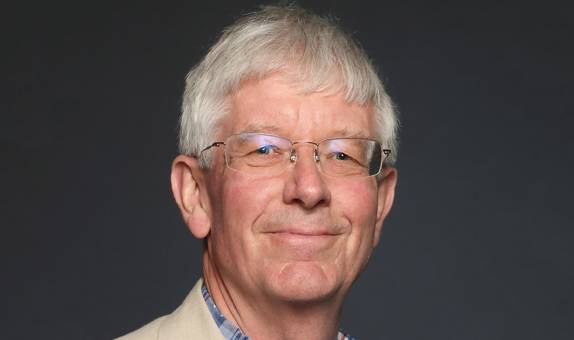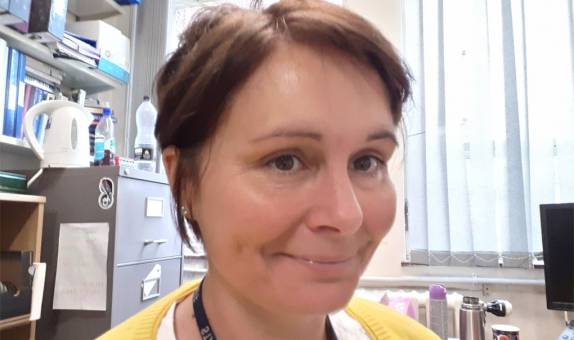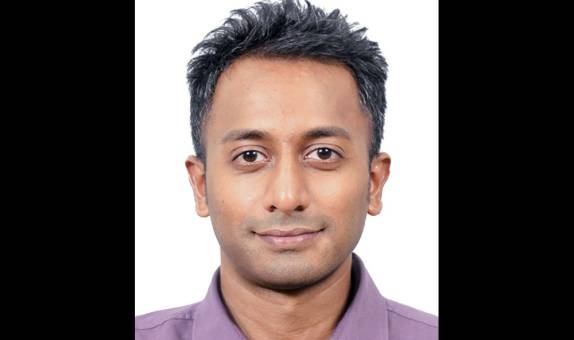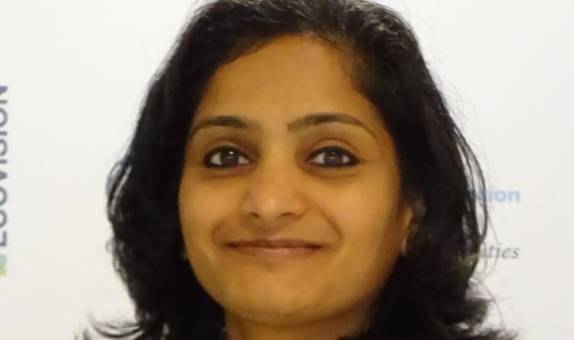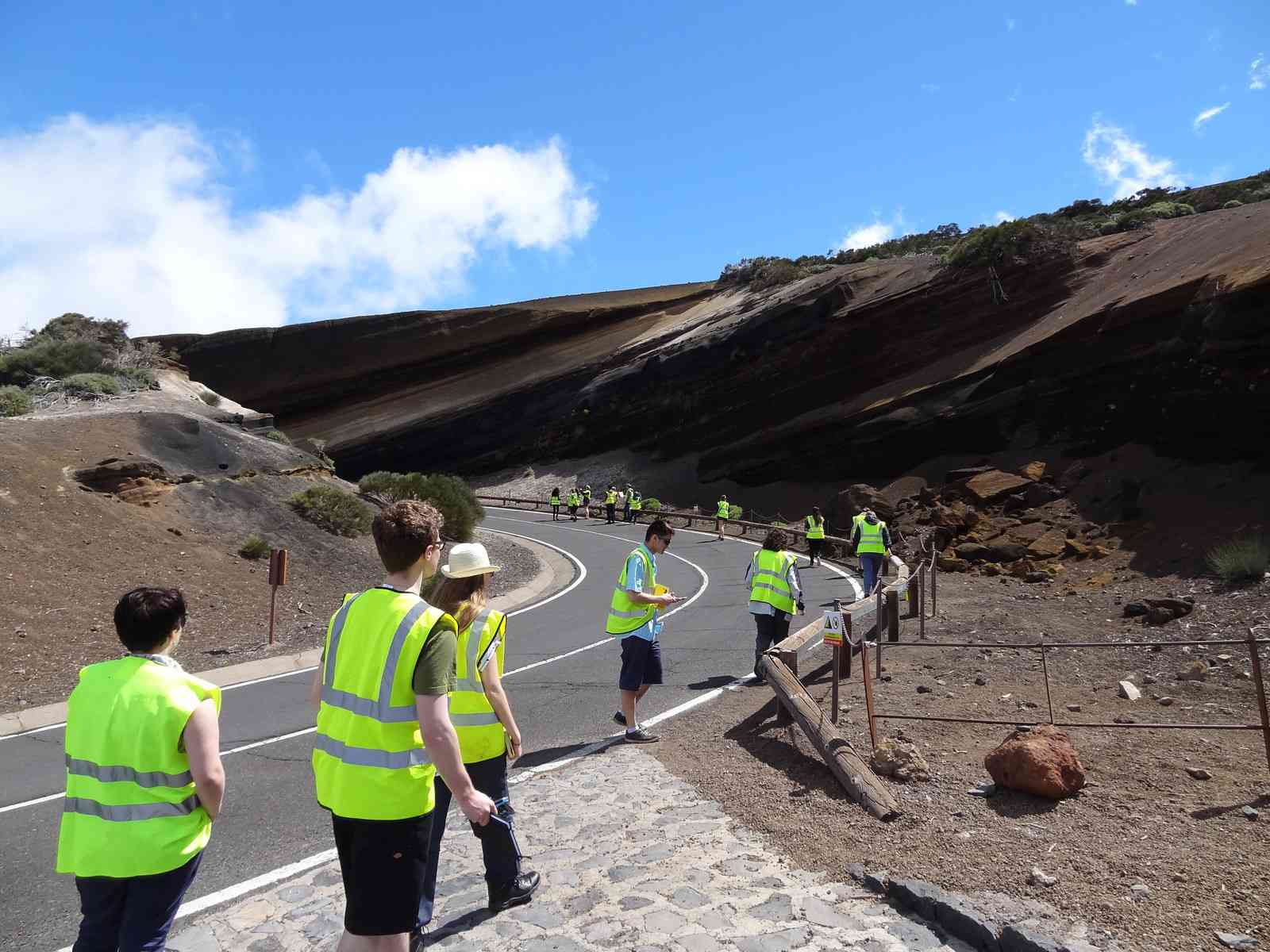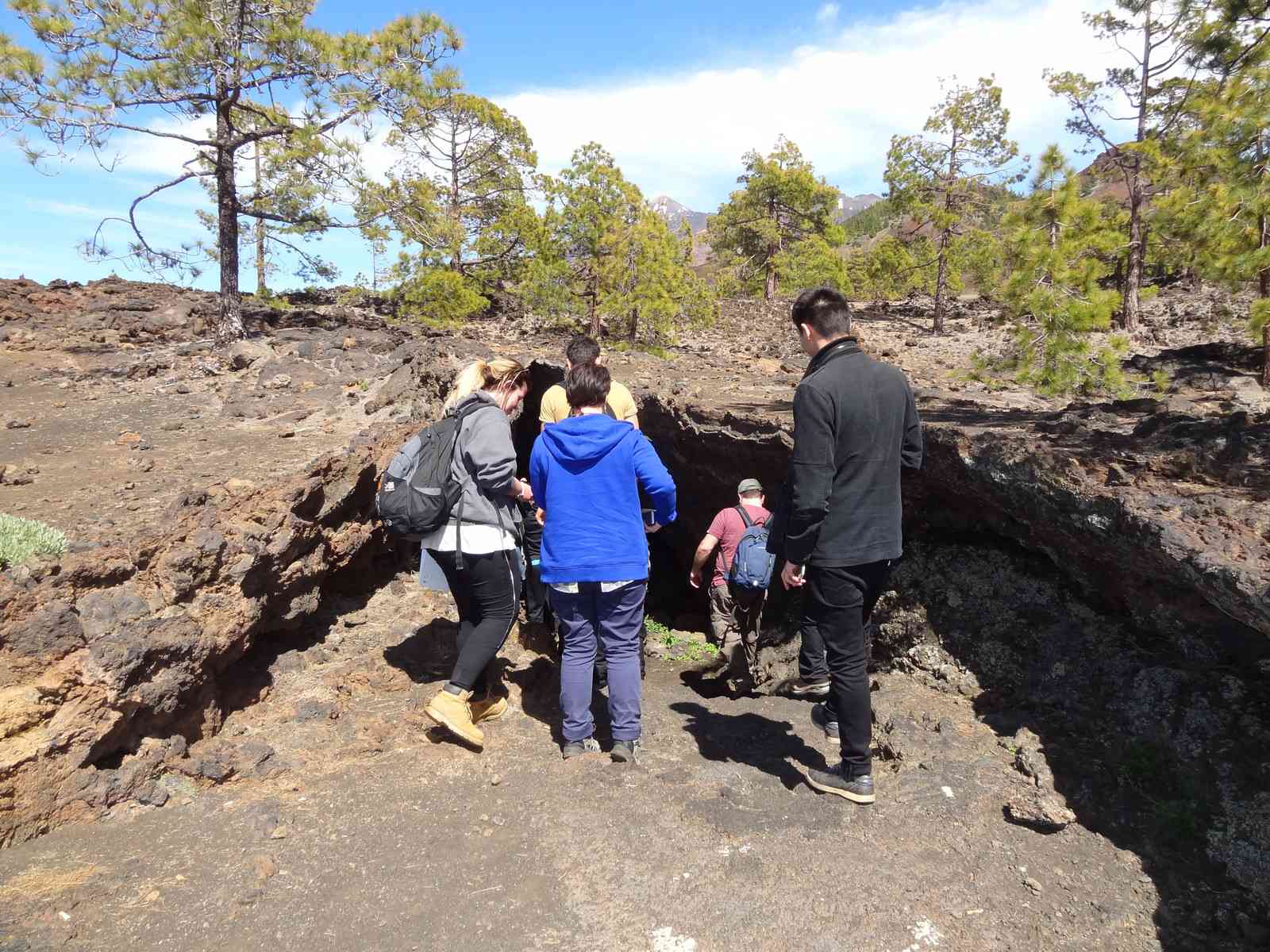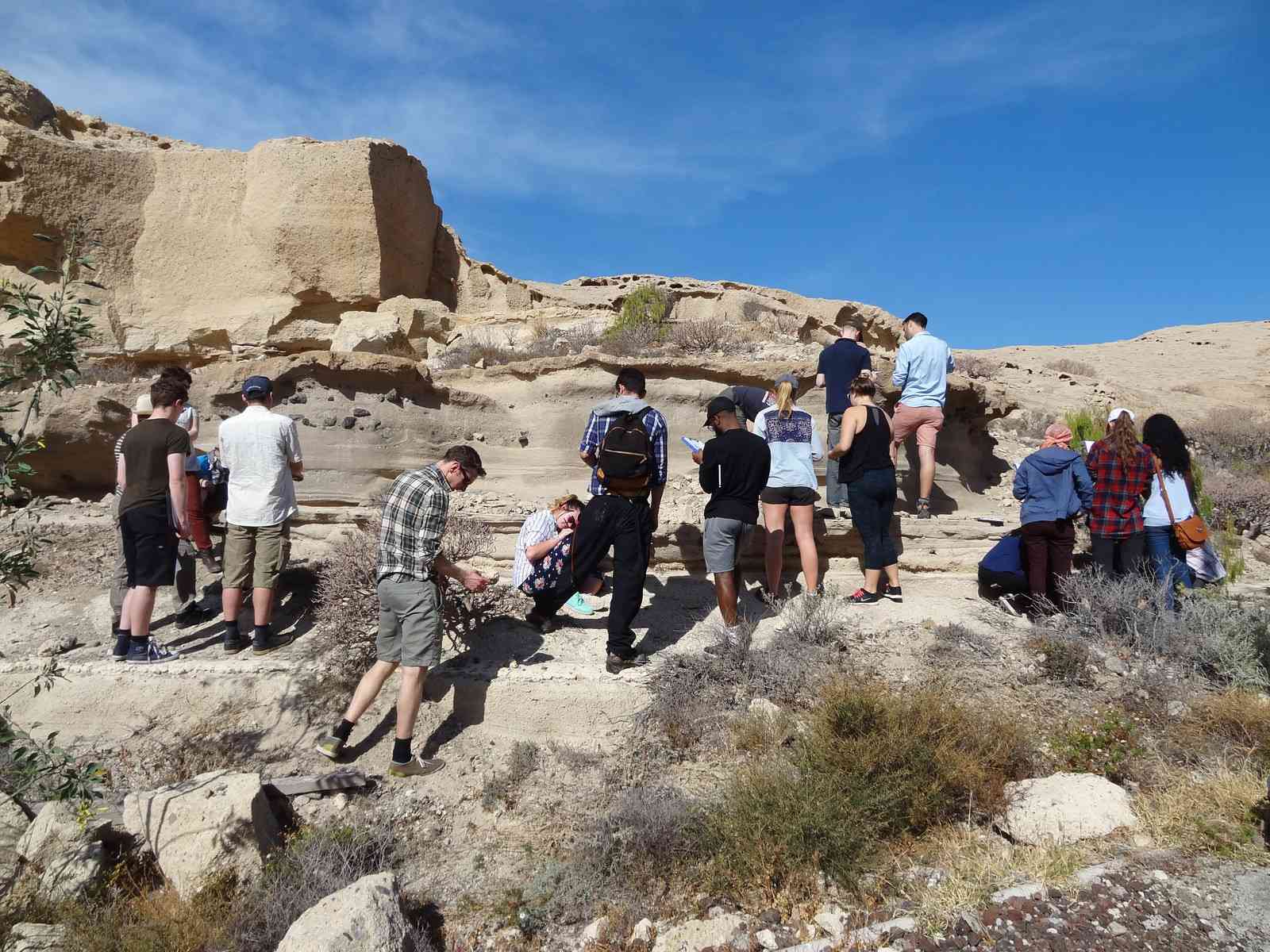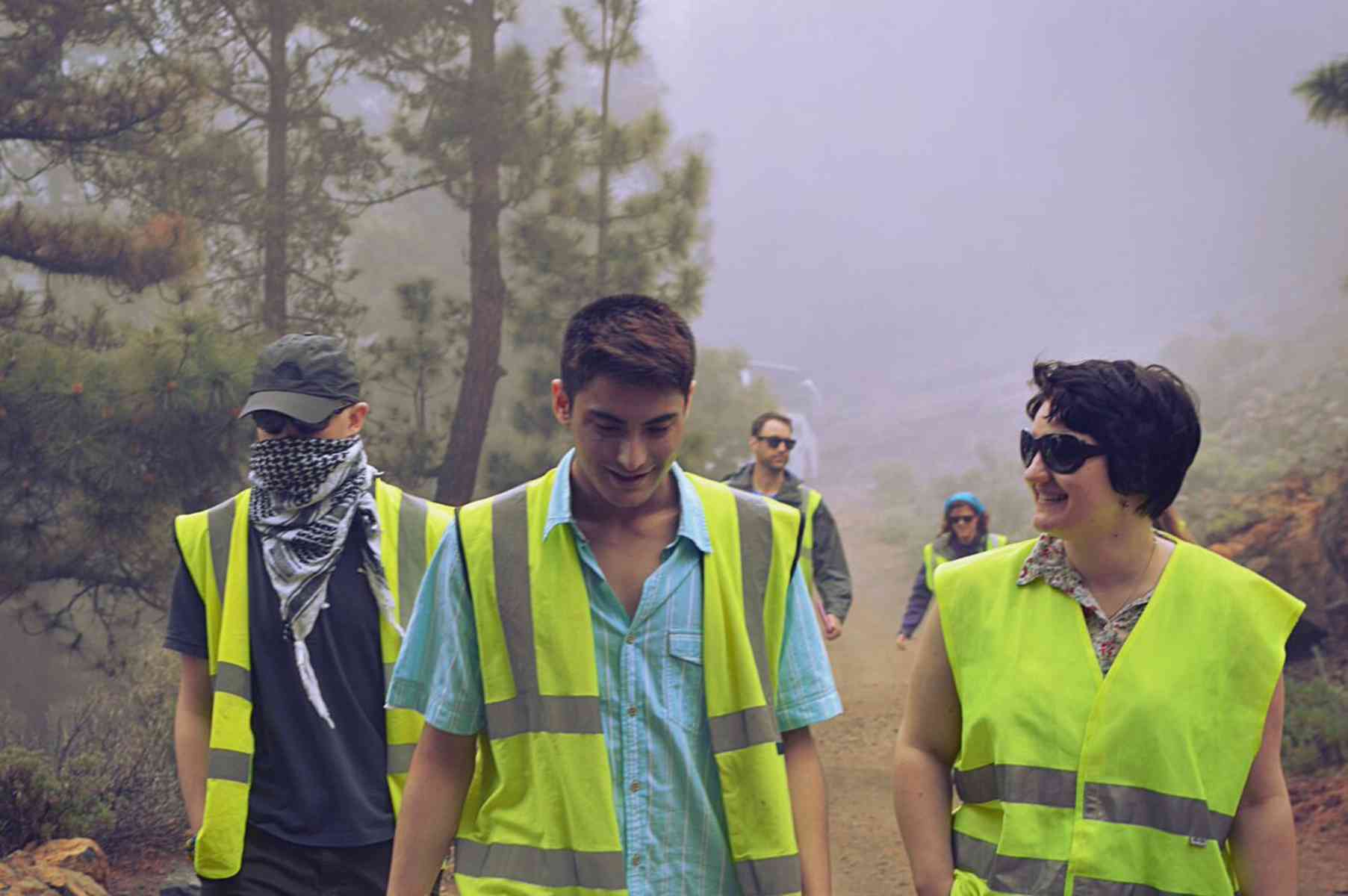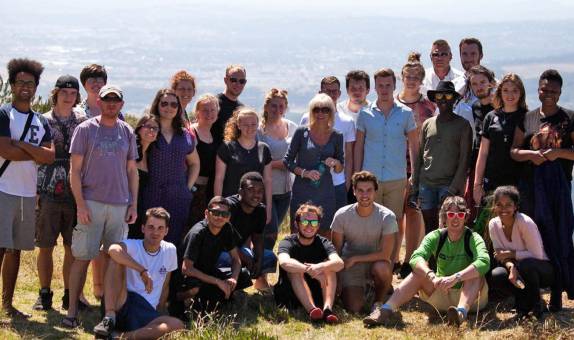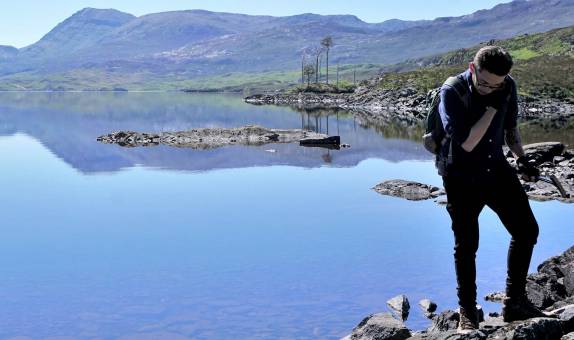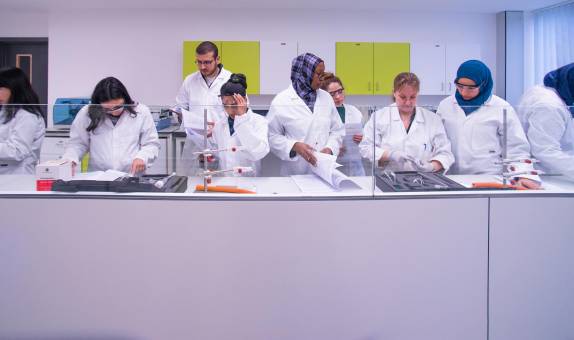Geography BSc (Hons)

Teaching Excellence Framework (TEF) Gold award
Our commitment to high quality teaching has been recognised with a TEF Gold rating. The University has received an overall rating of Gold, as well as securing a Gold award in the framework's two new student experience and student outcomes categories.
Why choose this course?
This course is concerned with understanding the Earth's environments and the global concerns of humanity. It offers a perfect balance of skills learning and practical fieldwork.
Fieldwork takes place in the UK and Europe and beyond. Subjects include globalisation, sustainable development, climate change and mitigation, social justice, cities and ruralities, resource management, geomorphology and geophysical hazards, oceans and atmospheres, environmental monitoring and biodiversity.
Teaching on the course will support your professional development. It often takes place with planning departments, environmental agencies, business support networks, community organisations and town centre management teams.
We value diversity and inclusion and encourage our students to bring their experiences and backgrounds into our classrooms.
| Attendance | UCAS code | Year of entry |
|---|---|---|
| 3 years full time | F800 | 20242025 |
| 4 years full time including sandwich year | F801 | 20242025 |
| 4 years full time including foundation year | F808 | 20242025 |
| 6 years part time | Apply direct to the University | 20242025 |
Please note: Teaching on this course may take place on more than one KU campus.
| Main location | Penrhyn Road |
Reasons to choose Kingston
- This course has been accredited by the Royal Geographical Society (RGS).
- We offer a diverse range of modules in both Human and Physical Geography so you are free to choose which areas of the discipline are of most interest to you.
- Strong emphasis is placed on the applied nature of geography. This means you'll engage with real-world learning, working in partnership with local authorities, community groups, international agencies, and NGOs, both in the UK and on fieldwork abroad.
- Our careers team offer a programme of events and training sessions which will help you make the best of your career choices.
- 100% of students found the course intellectually stimulating, thought staff were good at explaining things and made the subject engaging (NSS 2023).
Accreditation
The course is accredited by the Royal Geographical Society (with IBG). Accredited degree programmes contain a solid academic foundation in geographical knowledge and skills, and prepare graduates to address the needs of the world beyond higher education.
What you will study
On this course you will study core modules in geographical theory and research methods along with optional modules in the areas of Human Geography, Physical Geography, and Geographical Information Systems (GIS) where you will learn about digital mapping and spatial analysis. In this way you can tailor your course to suit your interests and career aspirations.
For example, if you are interested in Human Geography you can specialise in human modules, or if you are interested in Physical Geography you can focus on physical/environmental modules. If, by contrast, you are interested in a blend of human and physical issues you can choose a mix of modules from across the spectrum of the discipline. You can also choose to focus on Geographic Information Systems (GIS) as this is offered in both core and optional modules.
Year 1
Year 2
Optional sandwich year
Year 3/4
Year 1 provides a foundation in human and physical geography. You gain an understanding of the Earth, its environments, and the global concerns of humanity. You'll also be introduced to a broad range of key transferable skills, including data collection and analysis, critical thinking and geographical information systems (GIS).
Year 1 (Core modules)
Our Dynamic Earth
30 credits
This module introduces key fundamental topics in physical geography, overviewing the various spheres of the Earth, associated processes and interaction. Themes are presented systematically as a cross-section of the Earth's physical structure: geological underpinning, Earth surface processes (introducing geomorphology, the pedosphere and hydrosphere), the atmosphere, and the biosphere.
Interwoven within these topics are lectures on associated environmental hazards, including geophysical hazards (e.g., volcanic eruptions, earthquakes and tsunamis), atmospheric hazards (including hurricanes and tornadoes) and environmental and ecological hazards (including oil spills, and wildfires).
Processes behind these major natural and man-made environmental hazards will be described, with reasons provided for their occurrence and global spatial distribution. Detailed case studies from a variety of geographical regions will help to build a portfolio of examples, enhancing student knowledge of the processes, impacts and means of forecasting and mitigating against hazards becoming disasters.
The module introduces students to the application of environmental and geophysical knowledge and skills to real world challenges and potential discipline-related employment opportunities.
Introducing Human Geography
30 credits
This module is designed to introduce students to key geographical theories and concepts whilst providing a foundation for future studies in Human Geography. Students gain a broad understanding of the relationship between human societies and a range of economic, cultural, social and political processes at a variety of scales.
The module is delivered using lectures and seminars and is supported by a range of online materials. The lectures introduce students to key geographical themes and ideas with the seminars providing the opportunity to explore these further in a group setting. The module provides an essential introduction to future human geography modules that focus in more detail on key geographical theories, concepts, and processes.
Digital Mapping
30 credits
Maps are tools for visualising spatial information to communicate pattern, processes, and the results of geographical analysis. This module explores the principles and practice of map design and production using Geographical Information System (GIS) software. GIS are introduced, including representations of reality, data types, data management, data quality, and simple analytical operations.
The cartographic design process will be explained including graphic design principles and different modes of delivery (hardcopy/web map/3D) and contrasted to ‘traditional' manual map-making. Legal and ethical issues relating to copyright and attribution of data and media are explained.
Student's digital literacy employability skills will be developed, and the module will provide a baseline for developing more advanced GIS and mapping skills and levels 5 and 6.
Research and Fieldwork Methods
15 credits
This module introduces students to a range of research methods that form the basis of successful investigations in their subject discipline areas, including research design, qualitative and quantitative data collection, and analysis interpretation.
The module, importantly, also introduces fieldwork as a key investigative element of both environmental and geographical study, and the module incorporates the core Level 4 fieldwork, developing both generic fieldwork skills (e.g., pre-field trip reconnaissance using a range of secondary data sources and remote sensing, field safety risk assessments, safety in the field, and ethical considerations) and discipline specific site investigations (e.g., field observations, triangulation for map location and geometrical data collection using compass-clinometers, surveying techniques and GPS location, water quality surveys, analyses of archival data, and questionnaires and interviews).
Sustainability for Professional Practice
15 credits
This module will explore the global environmental, economic, and social problems that society faces and encourage students to find and create sustainable innovative solutions.
The students will be introduced to the complex societal problems and current challenges associated with social justice, cultural inequalities, ethics, and climate change emergencies, this will enable them to reflect on the UN Guiding Principles on Business and Human Rights. The students will be immersed in a culture of education that provides knowledge, values, attitudes, and skills and encourages them to think about possible solutions seeking to balance economic, environmental, and social objectives set by the United Nations Sustainable Development Goals (UNSDGs), and the challenges in achieving those goals.
Students will be able to develop knowledge, values, attitudes, and skills associated with systems thinking and integrated problem-solving within the context of environmental systems and processes and the built environment. This will encourage students to critically address ways to mitigate and solve complex global societal problems addressed by the UNSDGs.
Working in teams, students will explore, and debate: to evaluate the interconnectivity between the United Nations Sustainable Development Goals (UNSDGs), collaborate and co-design practical and equitable strategic solutions to Net Zero carbon (positive), and evaluate sustainability-related global challenges (e.g., the climate emergency) while developing critical thinking and self-awareness
Developing Academic Skills
15 credits
Students are introduced to their course learning aims and consider their anticipated learning targets from induction to graduation. Students are guided to identify and take ownership of their personal academic journey through the development and application of academic skills aligned to KU Graduate Attributes and their discipline-specific professional body learning outcomes.
Students are tutored in a range of learning to learn techniques and are introduced to assessment for learning and the role of feedback, reflection and feedforward as an integrated part of their learning journey. This will be supported through active engagement in the KU Navigate Programme enabling students to understand and begin to develop a design thinking approach to Future Skills development.
In Year 2, you'll deepen your knowledge of specialist topics in geography and have the opportunity to focus on the particular areas of human and physical geography that interest you most. You will also develop more advanced research, analytical and practical skills through field trips at home and overseas.
Year 2 (core modules)
Geographical Theory and Practice
30 credits
This module focuses on the development of geographical thought and practice from the institutionalisation of the discipline to the present. In doing so, the module traces the shifting paradigms that have dominated the discipline and examines the multiple approaches now possible within geographical research and the methodologies that underpin them.
Focusing on a range of topics, part student selected, the module will explore the diverse ways that geographers working in different paradigms have approached these topics. Having developed a sound knowledge of geographical research, theory and practice, students will then develop an independent research proposal. In doing so, students will identify a topic of their choice, select a suitable disciplinary perspective from which to examine it and an appropriate method of investigation.
Within the first part of the module students will gain a thorough understanding of the nature of geographical research. In the second part of the module, students will apply this knowledge through the development of their own research project
Advanced Research Methods and Project Management
30 credits
This is a core module for Geography students. In the first part of the module students will be trained in quantitative and qualitative data analysis. In doing so, students will learn how to collect, collate, analyse and critique qualitative and quantitative data. In the second part of the module students will build on the skills developed in TB1 in the execution of an interdisciplinary team based project.
Year 2 (optional modules in Physical Geography)
Rivers, Oceans and the Atmosphere
30 credits
This module explores the physical science of Earth's hydrosphere and the atmosphere, key processes and principles, and associated hazards. Through a sculpted narrative, the module curriculum will take students on an investigative journey to explore land, ocean and atmosphere environments and their interactions, with a persistent focus on the impact of climate change on these systems.
The narrative will follow the water cycle, starting with precipitation on land and a study of drainage basins, followed by investigations of rivers, estuaries and coasts, then on to the ocean and ocean circulation, and finally the atmosphere. Hydrological and sedimentological processes will be considered, following a source to sink approach.
A variety of hydrospheric and atmospheric hazards will be considered throughout the module, including riverine and coastal flooding, sea-level rise, and severe weather hazards associated with ENSO, the Indian Ocean Dipole and the SE Asian Monsoon System. Fieldwork, GIS and remote sensing practicals will be integral to this module, providing real-world skills and training relevant to a wide variety of environmental science, hazards and geography careers.
Understanding our World with GIS
15 credits
With the increasing focus on data science and big data, data literacy and the ability to develop and implement analytical workflows have become essential transferrable skills. This module is concerned with how to obtain, process, integrate, analyse, visualise, and analyse geographical data within GIS software to discover and quantify spatial patterns. It offers the means to critically evaluate data, analytical approaches, and the outcomes in relation to the principles of information and cartographic design.
The principles and methods of digital data collection and post-processing are introduced (e.g., GPS, mobile apps, aerial and space-based survey, secondary data, APIs). Students will learn how to apply exploratory and basic analytical techniques (e.g., buffer, spatial join, overlay, surface and network analysis) to discover pattern. They are introduced to and gain practical experience of the relational database, and network and surface data models and their analytical use.
Geomorphology and geophysical hazards
15 credits
This module presents a series of thematic taught sessions overviewing major geomorphological processes and landforms, sedimentary environments and potential hazards associated with these environments. Students will investigate a diverse range of geomorphological environments encapsulating a variety of continental and tectonic terranes and coastal landscapes.
Module curricula will explore geomorphological features fundamental to these various environments and consider the geological and geomorphological processes that shape these landscapes. Geomorphological change will be considered for the various landscapes and, in concordance, students will explore how climate change is impacting the various environments, in what way this affects populations living in these areas, and how the risk can be managed.
On completion, students will gain a detailed understanding of the major surface processes and their geomorphological significance and will be able to interpret a range of geomorphological landscapes. The module emphasises the mastery of geomorphological skills through experiential learning closely associated to core lecture delivery.
The practical programme will aid students in evaluating key geomorphological concepts, learning and testing analytical techniques. The fieldwork programme provides an arena for applying new skills and knowledge gained and provides a learning bridge to students wishing to pursue physical geographical and/or hazards-based research projects at Level 6.
Year 2 (optional modules in Human Geography)
Disasters, Society and Culture
30 credits
This Level 5 module introduces the key theories and concepts in the social science approaches to understanding disasters, one of the major global challenges facing humanity. It explores the social, cultural, political, economic and other factors that combine to construct vulnerabilities to disasters, and the ways in which these might be countered through Disaster Risk Reduction (DRR) strategies. These issues are explored at a range of spatial scales, from the local to the global, along with the inter-linkages and process that bind them together.
The relationship between evolving theories and practice are explored through a number of case studies which consider developed and developing world examples across a variety of hazard types. The challenges posed by the interdisciplinary approaches that are necessary to tackle disasters, and the need to communicate with a wide range of stakeholders, are examined. The complex range of factors influencing DRR implementation in particular contexts, and the variety of skills needed to evaluate DRR are investigated through fieldwork.
The fieldwork will also provide an opportunity for students to gain an understanding of the processes involved in developing a research proposal. Employability skills and the transferability of acquired knowledge to the workplace environment are introduced and developed.
Capitalist Societies
15 credits
The module is designed to introduce students to the basic principles of investigating a range of contemporary global issues in terms of their political economy. This includes a wide range of spatial issues from the local to the global and the inter-linkages and process that bind them together.
The key focus is to understand how contemporary capitalism works and plays out across different spatial levels and to highlight the processes that underpin it and the implications for different communities and their environments. This includes exploring relations between, state, business and citizens within the context of how we understand the global development challenges of climate change and sustainable development.
Cultural Geographies
15 credits
This module examines geographical approaches to the study of societies and cultures, and their relationships with the environment, past and present. In doing so, the module examines the development of different approaches towards the study of people and place, the representational forms used and produced, the positions from which they speak, and their role in shaping discourses about people and place in various parts of the world.
The module is case study based where students examine research from the academic literature, some of which will be instructor-led, and some of which will be independently sourced by students. Students will also be asked to apply the ideas discussed in class to real world examples.
The optional sandwich year between Years 2 and 3 includes a work placement or international exchange. The work placement gives an opportunity for paid work and valuable experience in a relevant professional environment.
The international exchange gives you an opportunity to travel, meet new people, build links in another academic environment and develop your geographical skills and knowledge.
We will keep in touch with you throughout your placement or year abroad, ensuring the skills and training you receive translate effectively into your studies and career aspirations.
Your final year will enable you to continue to specialise in areas of geography you find inspiring and choose from modules covering a wide range of topics. Your final year independent research project will reflect your personal interests and help you develop your employability skills. You can also choose to apply your knowledge and skills either in an overseas setting or more locally in London.
Final year (core modules)
Research Project
30 credits
This module provides students with experiences in the design, preparation and execution of an independent and supervised programme of research. The module guides students to employ reflective learning techniques and to develop a variety of level-appropriate employability skills by engaging with their research project as academic research with commercial, policy or political value which requires effective dissemination and communication to a range of suitable audiences.
Employability skills developments are integral to the Research Project module. The specific nature of the research project chosen allows the students to target specific skills they wish to develop in their learning pathway and the project supervisors will work closely with the students to identify and articulate these skills and relate these to Future Skills.
Development Geographies
30 credits
This module introduces students to critical theories of development and challenges students to critically reflect on their value in real world situations. It also explores the relations within and between countries and the challenge of achieving sustainable development in the context of globalisation and climate change. The module includes substantial international non-European fieldwork and independent desk-based research.
Whilst it introduces theories of development, it is also an applied module which seeks to empower students to debate contemporary geographical issues within an international context.
Assessment seeks to engage students in critical appraisal of real world situations, and in strategic planning of interventions, so enhancing students' practical skills and employability.
Applying Professional Skills
15 credits
Students will demonstrate the ability to apply their developing professional skills competencies in their chosen area and will ensure they have a broad understanding of the business environment in which professional activities are undertaken. The module will develop the student's technical, management and interpersonal skills required to perform in a team environment and prepare the students for employment and entrepreneurship.
Students will participate in Kingston University's Bright Ideas competition where they will work together as a team to develop a business idea of their choice. To do this they will need to interact with relevant stakeholders outside the University.
Students will be guided to interact with professional and learning communities beyond the university and reflect on these interactions. This may include participation in co-curricular events such as subject-specific and career development events (e.g. talks, workshops, speed interviews), networking opportunities offered by the subject-specific professional bodies, exploring pathways to professional chartership/membership, leveraging interactions with professionals in the development of the final year research project and, reflecting on the co-benefits of these interactions.
Final year (optional modules in Physical Geography)
The Science of Climate Change
15 credits
This module explores the science of climate change through an in-depth exploration of the components of the climate system and an examination of climate change indicators such as sea-level change and ocean acidification. The influence of human activities that contribute to climate change, such as greenhouse gas emissions and deforestation will be explored and future climate models and scenarios will be evaluated.
The module will highlight how recent climate change is predominantly due to anthropogenic forcing rather than natural climate drivers. Students will learn to critically evaluate and discuss models of future climate change and will produce their own climate projections for the UK based on real data.
The fieldwork programme will also provide students with an opportunity to enhance their understanding of climate change by seeing examples of past climate change in the local palaeo and geomorphic record. Examination of the palaeo record of past climate change will give context to the evaluation of future projected climate change scenarios.
Water Resources Management
15 credits
The module examines global water management challenges and sustainable options to seek their resolution. The module will develop the student's understanding and critical evaluation of these challenges from several perspectives including the challenges associated with environmental, social and economic change. This will include the examination of issues such as water scarcity and climate change, concerns for water security, land use impacts, socio-political drivers for change and regional water management issues.
The module will highlight a range of employability skills and challenge students to identify and value the transferability of these skills to the workplace and discuss cross-reference to the KU Graduate Attributes. These will include an assessment as learning activity that will develop fieldwork skills, design thinking and problem-solving and the communication of environmental knowledge. Where appropriate, external speakers will contribute to the debates.
Final year (optional modules in Human Geography)
Communities and Social Justice
15 credits
This module looks at social, spatial and environmental injustice and the ways in which such issues can be addressed. Using case studies from around the world, which include, but are not limited to, under-served, indigenous, refugee and asylum seekers, gypsy Roma and traveller communities
The module looks at the social, cultural, economic and political factors that underpin the rights and the denial for some communities to access core fundamentals such as land and resources, citizenship, freedom of expression, employment, shelter, accommodation and food security. Students will also examine social movements and forms of activism, as well as policy initiatives, that seek to redress social injustice and consider the role of research in raising public awareness of cases of social, spatial and environmental injustice at a range of spatial scales.
The module covers both theoretical and applied material and the assessment provides students with an opportunity to appraise real world situations, through local fieldwork, external professional input, internationally documented case studies and creative thinking, specifically designed to enhance practical skills and employability.
Climate Change Hazards, Resilience and Solutions
15 credits
This module tackles the key issues relating to climate change in the three main subject areas of science, policy and society. The module presents a series of thematic taught sessions (classroom and field-based) overviewing: climate-related hazards and disasters; how climate change is impacting the level of risk associated with various hazards – for example, heatwaves, droughts and wildfires, flooding events, and geophysical hazards; and the ways in which impacts and risk associated with climate change can be lessened through mitigation and adaptation.
Human activities in developed and industrialised nations in regions such as Europe, North America and East Asia have largely caused the changes in atmospheric composition and the current climate crisis; but it is poorer less developed nations (especially in Africa, south-east Asia and the Pacific islands) that are often most at risk to the increase in climate-related hazards. Students will learn how to examine, interpret and evaluate international, national and local policies and practices responding to climate change, and have the opportunity to engage in role-play debates and oral presentations.
The production of a detailed and coherent stakeholder report will provide real-world learning skills relevant to the environmental sector and tackling climate change. The fieldwork programme will provide the students with the opportunity to enhance their understanding of climate-related societal issues and consider current case studies of adaptation and mitigation.
Final year (optional modules in GIS)
Solving Real World Problems with GIS
15 credits
This module offers in-depth knowledge as well as hands-on skills for a series of spatial analytical and modelling approaches that can be used for solving real-world problems.
At the heart of this module will be the notion of spatial understanding of data science. This relates to the fundamental notion in geography and environmental science whereby spatial patterns and spatial inequity are rife in the real world (e.g., high property price in accessible and branded areas; persistence of crime hotspots; specific ecological habitats that exist for particular species; regions prone to a specific natural hazard such as hurricanes).
Offering solutions to these various challenges require a systematic and quantitative appreciation as well as suitable interpretation of the data, and this module is designed to offer the means to achieve this through a series of spatial analytical and spatial statistical methods, including point pattern analysis, spatial interpolation and spatial regression.
Please note
Optional modules only run if there is enough demand. If we have an insufficient number of students interested in an optional module, that module will not be offered for this course.
Future Skills
Knowledge to give you the edge
Embedded within every course curriculum and throughout the whole Kingston experience, Future Skills will play a role in shaping you to become a future-proof graduate, providing you with the skills most valued by employers such as problem-solving, digital competency, and adaptability.
As you progress through your degree, you'll learn to navigate, explore and apply these graduate skills, learning to demonstrate and articulate to employers how future skills give you the edge.
At Kingston University, we're not just keeping up with change, we're creating it.

Entry requirements
Teaching and assessment
Scheduled learning and teaching on this course includes timetabled activities including lectures, seminars and small group tutorials.
It may also include placements, project work, workshops, workshops in computer labs, and laboratory workshops.
Who teaches this course
The course is taught by the Department of Geography, Geology and the Environment. Staff have a wide range of experience across research and industry and continue to practice and research at the cutting edge of their discipline. This ensures that our courses are current and industry informed ensuring you get the most relevant and up-to-date education possible.
The Department has invested substantially in the development of laboratories for teaching and research into subjects such as environmental monitoring, geology, geochemistry, mapping / GIS / computing facilities, and specialist instrumentation laboratories (e.g. nuclear metrology, laser Raman spectroscopy, 3D mapping).
Postgraduate students may run or assist in lab sessions and may also contribute to the teaching of seminars under the supervision of the module leader.
Field trips for this course
"How many people can get to say 'I went to Africa doing my degree!'" – Regina Hamilton, Geography BSc(Hons).
At Kingston we place a strong emphasis on real world learning. That is we learn by ‘doing' geography. Geography is not just the stuff in books but the stuff that is out there in the world. Fieldwork will provide you with an opportunity to participate in real world learning.
Below are the main field trips for the geography courses. Remember they can vary from year to year according to circumstances and new opportunities. Some optional modules also involve local excursions.
Year 1: Weymouth, Dorset
The Year 1 four-day field trip currently takes you to Weymouth, Dorset. Staff will introduce you to the geographical setting and to the physical and human landscape. Here you will learn about the relationships between society and the environment and consider the ways in which we collect and analyse data to understand social and environmental issues.
Year 2: A European destination
In Year 2, students currently participate in fieldwork activities in Tenerife. This provides the opportunity to study an environment very different to that of the UK. Tenerife is incredibly diverse, with huge contrasts in climate, soil types and ecology. Here students focus on hazards and disaster risk management as understood and approached from a range of stakeholder perspectives.
Year 3: International fieldwork
In Year 3, students have had the chance to explore development issues in an international context. We are currently focusing on Malta, although previously we have focussed on Morocco and on South Africa. Students engage with local authorities and development agencies, NGOs, members of the business community and local people to explore key development challenges in this context.
Students also have opportunities to engage in optional fieldwork during the summer. This is part-funded by the University. Recent summer fieldwork destinations include Almeria, Spain and Bandung, Indonesia.
Facilities
There is a wide range of facilities for practical work at our Penrhyn Road campus, where this course is based. You will have access to a modern environment with the latest equipment, including:
- the £9.8 million Eadweard Muybridge building with state-of the art laboratories;
- the new £20 million John Galsworthy building with a range of teaching rooms and computing labs;
- the award winning Town House, with a well-stocked library that boasts an impressive collection of texts, journals and online e-books/journals; and
- excellent social spaces, plus a large, fully equipped gym and fitness centre.
Course fees and funding
Additional costs
Depending on the programme of study, there may be extra costs that are not covered by tuition fees which students will need to consider when planning their studies. Tuition fees cover the cost of your teaching, assessment and operating University facilities such as the library, access to shared IT equipment and other support services. Accommodation and living costs are not included in our fees.
Where a course has additional expenses, we make every effort to highlight them. These may include optional field trips, materials (e.g. art, design, engineering), security checks such as DBS, uniforms, specialist clothing or professional memberships.
What our students say
After you graduate
Graduates work in a wide range of areas, such as local government, retail, human resources, finance, insurance, ICT, education and research. Many graduates progress to postgraduate studies.
What our graduates say
Check out what our graduates have gone on to do and how studying at Kingston helped them achieve their goals.
Janak Mistry
Geography graduate Janak Mistry talks about his time studying at Kingston University, and his position in the Lloyds Banking Group graduate scheme.
Mark Banfield
Geography graduate Mark Banfield talks about his time studying at Kingston University, and his role as vice president at Autotask.
Oliver Hall
Geography graduate Oliver Hall talks about his time studying at Kingston University, and his position as an operations director at Liquid Productions.
Steve Smith
Geography graduate Steve Smith talks about his time studying at Kingston University, and his position as a geography teacher.
Women in science
Part of our women in science series – find out about Chrisa Tsiarigli, who graduated in 2002 with a Geographical Information Systems with Business Management BSc(Hons).
She is currently a principal public health intelligence specialist for the NHS south-west London sector.
Links with business and industry
Staff are involved in active research so illustrate teaching with up-to-date, relevant experience.
Work placement year
How you can work in industry during your course
Why take a placement? Work placements:
-
provide work experience that is relevant to your course and future career;
-
improve your chances of graduating with a higher grade degree;
-
enhance your CV;
-
lead to a graduate job;
-
enable you to earn a year's salary whilst studying (the vast majority of placements are paid); and
-
help you to select your final-year project.
"To be successful, tomorrow's leaders will need to be far more rounded individuals than ever before. They will collaborate in pursuit of shared goals. They will guide, challenge and support...They will have an appetite for change and a hunger for continuous improvement, and they will have an ethos of learning and development..."
Jeremy Darroch, Former Chief Executive, Sky
"Doing a placement year effectively gives you one foot in the door of a future job and to stand out from the crowd... as well as enhancing my CV... and future interviews. It's a great motivator to be successful in my studies as it only serves to open even more doors and gain more skills."
Placement student at Jagex Games Studios Ltd
-
81% placement students and 34% non-placement students got a first or 2.1 (Faculty of Computing, Information Systems and Mathematics, 2008).
-
100% of placement students during 2008 recommend doing a placement (Faculty of Computing, Information Systems and Mathematics, 2008).
-
Many employers offer a graduate job to their successful placement students.
There is a lot of support available for students looking to secure a placement (eg a jobs board with placement vacancies, help with writing CVs and mock interviews). Getting a placement and passing the placement year are ultimately the student's responsibility.
For further information please contact the Placements Team by telephone 020 8417 2969 or email secplace@kingston.ac.uk.
Key information set
The scrolling banner(s) below display some key factual data about this course (including different course combinations or delivery modes of this course where relevant).
Course changes and regulations
The information on this page reflects the currently intended course structure and module details. To improve your student experience and the quality of your degree, we may review and change the material information of this course. Course changes explained.
Programme Specifications for the course are published ahead of each academic year.
Regulations governing this course can be found on our website.
*Fieldwork destinations vary depending on travel restrictions and staff interests. Destinations mentioned on this course page are examples from our most recent visits.


